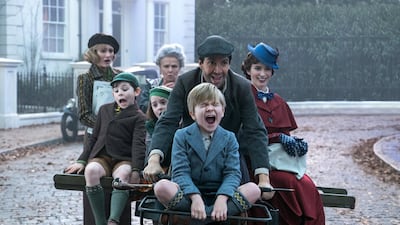It opens badly. The 1964 original began with one of the world's worst Cockney accents, via the jack-of-all-trades played by Dick Van Dyke. Rather than rectify this error, Mary Poppins Returns simply repeats it, casting the Puerto Rican-American Lin-Manuel Miranda as a London lamplighter: that is, the ridiculously talented playwright behind Hamilton, a bookish, thinking man who (let's be honest) really can't sing, let alone master a British accent.
Then comes Mary. Cor blimey, she is the worst. Imagine your snootiest friend, cross her with the most conceited person you've ever met, and then add on an accent so unfeasibly posh that even the Queen would cower in her presence: that's your "lovable" Mary Poppins.
Not one fibre of my motherly body would employ her as a nanny – unless I had ample use of a nanny spycam, in which case I would obsessively watch her to see if she secretly sobs at night from the exhaustion of keeping up her stage-hellion performance. Now that would be interesting character development! Where Julie Andrews was strict but caring, Emily Blunt enforces rules for no discernible reason, like a caricature of, well, an English governess. Where Julie Andrews was surprising, Emily Blunt has Attention Deficit Disorder, with a new spectacle thrown our way every other scene.
And when she’s not awash in CGI, she’s developed a strange tic of a thinking-person’s gesture, one hand floating on her face, the other arm resting in the air, as if she is balancing on an imaginary table. Does she not know we can see there is no table?
I recently rewatched the original film and was blown away by its contents: a bit of anti-capitalism, spiced up by some postcolonial critique, feminist suffrage, and general belief in creativity and feelings over reserve and order. Bring it on, Mary Poppins. In the climactic scene, the young George Banks refuses to give his tuppence to the bank; he wants to give it to a poor beggar woman instead.
The scuffle between the antediluvian bankers, who sing out the various overseas projects his money could fuel, and the young boy leads to an actual run on the bank: the film is talking about undermining the capitalist system! Pretty deep for a Disney flick.
But in this version, the young George – now a father himself – seems to have invested those tuppence after all, and it is those tuppence that save the day. In other words, it was not sweet, idealistic George who was right, but the bankers, with their song about colonialism and compound interest. The banking system has won! Hooray?
Once you swallow that little recognition of how far our horizons have closed in fifty-odd years, you’re still stuck watching a movie that won’t end: song after song after song tries to match the original joy, and each blends softly into oblivion. Don’t waste your time on this one: as the soundtrack itself acknowledges, after this remake, the only way is up.
___________________
Read more:
Emily Blunt on Mary Poppins: 'Nobody wants to see me do a bad impersonation of Julie Andrews'
First look at the magical 'Mary Poppins returns' trailer
Emily Blunt on her role in The Girl on the Train and relocating to the United States
___________________


